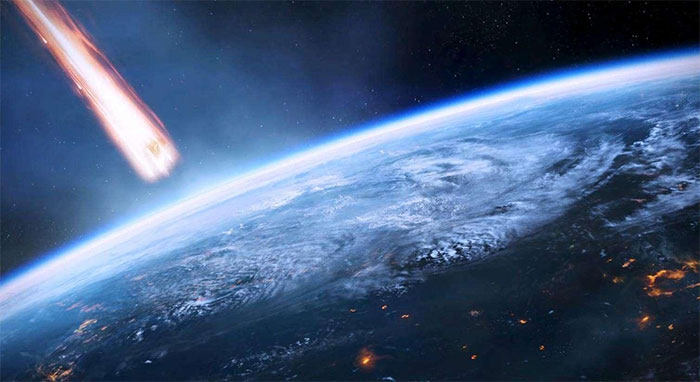The collision of terrestrial asteroids is not uncommon, every year about 500 meteors collide with the Earth, if one of them collides with humans, no one will survive. However, in reality, even though there are many cases of asteroids hitting the Earth, we rarely hear of someone hit by a meteorite, so what happens?
The solar system has one star and eight planets, but beyond that there are many asteroids and asteroids in the solar system. They can fall into Earth’s orbit under the impact of gravity and impact on Earth.
Small individual asteroids are 1 to 2 meters in diameter, and larger asteroids are no more than 1,000 kilometers in diameter. Among them, an asteroid with a diameter of more than 1 km collided with Earth, and the resulting explosive force could destroy all buildings and creatures around it.
American scientists tracked an asteroid numbered 1950 DA. The asteroid is over 1 km in diameter and if it hits Earth, an explosion equivalent to 44.8 million tons of TNT is likely to occur.
Asteroids with a diameter of more than 140 meters will cause severe damage to the Earth, asteroids with a diameter of more than 1 km will cause a global catastrophe, scientists said. The extinction of the dinosaurs 65 million years ago was caused by an asteroid about 10 km in diameter hitting the Earth. The enormous energy released causes natural disasters such as tornadoes, tsunamis, earthquakes and volcanic eruptions, leading to dinosaurs – the Lord of the Earth at the time of extinction.
The consequences of an impact of an asteroid on Earth are very serious, but why do we experience more than 500 collisions per year, not only harmless, but also extremely rarely heard by anyone in Heaven.
This is because the Earth has a thick atmosphere, asteroids less than 10 meters in diameter will be scorched in the atmosphere and very difficult to affect the survival of humanity.
In addition, the likelihood of larger asteroids reaching Earth is very low, according to scientists, an average asteroid about 1 km in diameter strikes Earth on average every 500,000 years. Asteroids about 5 km in diameter crash into Earth, occurring on average every 10 million years. Collisions with asteroids over 10 km in diameter are rare. The most recent major asteroid collision occurred 65 million years ago.
Although Earth experiences over 500 asteroid collisions each year, most of them do not form asteroids and they all burn in the atmosphere.
But there are still very few asteroids that can reach the ground, so why aren’t there asteroids hitting humans?
We know that the Earth is 70% ocean and 30% land. The odds of asteroids landing all over Earth are the same, so there is a 70% chance that asteroids will fall into the ocean and only a 30% chance that they will land on Earth.
And in a land with sparsely populated areas such as forests, deserts, deserts and mountains, the population density here is not large, although it decreases, the probability of hitting a human is also very low.
However, the low probability doesn’t mean it never happened. During an asteroid impact in Egypt in 1911, a dog was killed, which is also one of the few recorded meteorite victims.

We can see that the likelihood of an asteroid hitting you is very low, as low as the likelihood of winning the lottery.
Out of more than 500 annual asteroid collision events, only 4 to 5 meteors have been collected by scientists.
Due to the rarity of meteors, collectors are willing to spend huge sums of money to collect meteorites. From the point of view of scientific research, meteorites contain material from the early formation of the solar system, the study of meteorites helps us know the history of the Earth in its early days and there was life in it. space. or not, so it is not only a collector’s value but also a very high scientific research value.


